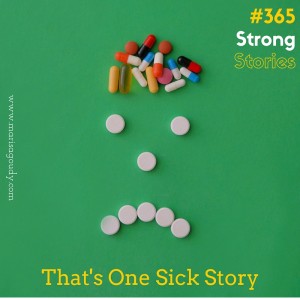That's One Sick Story, #365StrongStories 15
 The flu’s plot line is straight from the storytelling textbook. (Note: not all stories that fit the form are inherently interesting. That's your job.)
The mundane world (health) is jeopardized. The hero must quest for the remedy (chicken soup, time, drugs). A mentor is consulted (mom, healer, doctor). Either order is restored or catastrophe strikes.
The flu’s plot line is straight from the storytelling textbook. (Note: not all stories that fit the form are inherently interesting. That's your job.)
The mundane world (health) is jeopardized. The hero must quest for the remedy (chicken soup, time, drugs). A mentor is consulted (mom, healer, doctor). Either order is restored or catastrophe strikes.
If you’re writing a comedy, be sure to describe the fever dreams, the crazy clerk at the pharmacy, and the sheet volume of tissues and Friends reruns.
If this is a tragedy, you must explore “I never thought this could happen to us,” and perhaps sum it all up with a meditation on the flu vaccine, the limits of modern medicine, and God’s will or the complete absence of the divine.
But, when you’re in the midst of it - or, in my case, holding a two-year-old whose new mantra is “No fun. Tummy hurts” - there’s no comedy yet and you wouldn’t even entertain a tearjerker ending.
One of the toughest truths of writing about real life events: you can’t tell a satisfying story until the major conflict is resolved or the hero realizes something new.
And it’s damn hard to write much of anything when you’ve got a thermometer sticking out of your mouth or you're trying to stick one into a squirming toddler.
